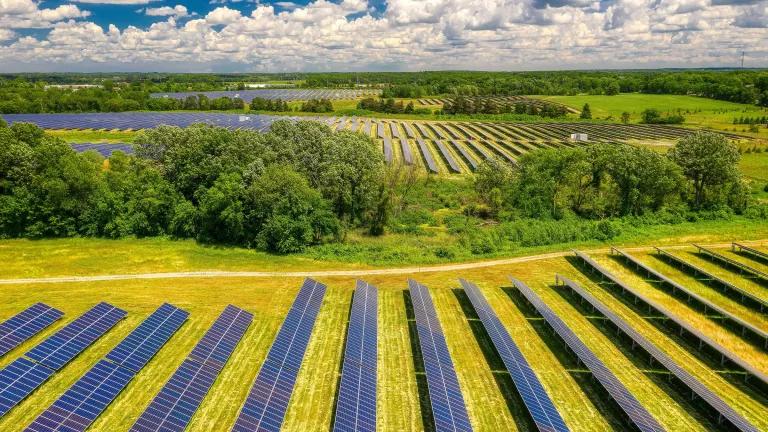This EE Day: Celebrate Energy Efficiency Wins
Energy efficiency (using less energy to get the same or higher benefit) is one of our best tools in the climate fight. In fact, energy efficiency measures alone could provide more than 40 percent of the emissions reductions required to meet the goals set out in the Paris Agreement.

Credit: iStock
Energy efficiency has contributed more to the nation’s energy needs over the last 40 years than oil, coal, natural gas, or nuclear power. Not only does efficiency reduce dangerous climate-warming pollution but it also saves Americans billions of dollars every year, stimulates our economy, provides high-quality jobs, improves public health, and can help to advance equity, especially helping lower-income Americans and renters. But energy efficiency progress doesn’t happen on its own. Energy efficiency needs champions to push for progress and secure wins.
Today is National Energy Efficiency Day and to celebrate this year - we are highlighting some of the major energy efficiency wins of 2022.
Efficiency in the Inflation Reduction Act
The recently passed Inflation Reduction Act (IRA) stands as the most significant federal government action on climate change in history. Its passing was also a massive win for energy efficiency. The bill contains tax credits and rebates for homeowners looking to improve the energy efficiency of their homes or upgrade to more efficient appliances.
As NRDC’s Lauren Urbanek outlined in her recent blog, the IRA contains two rebate programs that will make efficiency and electrification more accessible. One will provide rebates for whole-house energy savings and the other will incentivize projects to electrify the homes of those earning low or moderate incomes. Homeowners can also take advantage of efficiency tax credits in the bill that could cover 30 percent of the cost of certain energy upgrades. In addition, owners of affordable housing will have access to $1 billion to upgrade their buildings. As Urbanek writes, “IRA’s rebates and credits have the potential to enable a large-scale transformation of U.S. homes into efficient, clean, and affordable-to-run dwellings of the future.”
Efficiency Standards Settlement
Last month, the U.S. Department of Energy (DOE) agreed to review energy efficiency standards for twenty categories of appliances and equipment as part of a settlement agreement. After serious inaction from the agency under the Trump administration, NRDC, joined by efficiency advocates, consumer and low-income consumer advocates, and a number of cities and states, sued DOE in 2020 for failing to review and update the overdue energy efficiency standards, including standards for large energy users like refrigerators and water heaters.

Credit: iStock
As NRDC’s Joe Vukovich explains in his blog on the agreement, “energy efficiency standards set the minimum efficiency (or in some cases, maximum energy consumption) that products must meet in order to be legally sold in the United States. These standards ensure that when consumers purchase a product, they are getting ones that are good for both their pocketbook and the environment, not old, energy-guzzling ones.”
The savings from getting the efficiency standards program back on track will be significant. Updating these twenty overdue standards would mean approximately $650 billion in cumulative utility bill savings and the prevention of up to 1,800 million metric tons of carbon emissions through 2050. This settlement combined with the additional progress we have seen from the Biden administration is a big win for efficiency!
Efficiency in the States
New York:
New York State passed the Advanced Building Codes, Appliance and Equipment Efficiency Standards Act which set increased efficiency standards for multiple consumer appliances. In this blog, NRDC’s Rich Schrader and Marisa Guerrero highlight how the bill will reduce energy consumption, help curb carbon emissions, and save New Yorkers $15 billion over the next 15 years.
The bill also updates future building energy codes. As Schrader and Guerrero note, “By incorporating greenhouse gas emissions and the full useful life of building components into the life cycle analysis in the State Energy Code’s scope and design process, these standards will fully incorporate the benefits of energy efficiency and ultra-efficient heat pumps.” Also in New York this year, the Governor committed to the goal of two million climate-friendly homes, including substantial investment in low-income homes.
Washington State:
Washington adopted a requirement that all new commercial buildings must use high-efficiency space and water heating equipment that can run on 100% clean power and the state is prepared to extend similar requirements to new residential buildings. Alejandra Mejia Cunningham spells out in her blog how, “this new residential code would ensure that virtually all buildings constructed in Washington as of January 1st, 2023 are ready to meet the state’s ambitious but necessary building decarbonization goals.”
Colorado:
Colorado just passed a bill that will require any city or town that adopts or updates any type of building code to also adopt the 2021 International Energy Conservation Code. Alejandra Mejia Cunningham writes, “Unlike Washington, Colorado does not have a statewide building code. However, the state has a history of setting minimum energy efficiency levels for new buildings in municipalities that choose to adopt building codes.” She goes on to point out that homes built under this new code will save more than 9 percent in energy costs compared to those built to previous versions of the codes.
California:
California announced plans to invest over $1.4 billion to decarbonize homes, schools, and community centers – with most of the funding directed towards low-income families and disadvantaged communities. NRDC’s Merrian Borgeson takes a deep dive into the investments, including the $922 million for programs that will provide efficient electric appliances and other improvements to low-income families and $270 million for a program that will upgrade or build vital gathering places with efficient electric technology, energy efficiency, renewables, and storage.
Celebrate EE Day 2022
There is much progress to celebrate this Energy Efficiency Day. If you want to get involved, sign up as a supporter to join the thousands of individuals, governments, universities, organizations, corporations, and utilities who are participating in Energy Efficiency Day 2022. Make every day Energy Efficiency Day!





